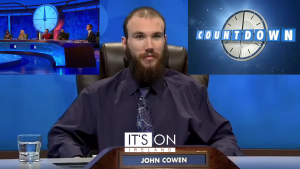Gretchen Whitmer Apologizes for Doritos Comment: Did She Really Mock the Eucharist?
Michigan Governor Gretchen Whitmer has found herself at the center of a controversy after a seemingly innocuous comment about Doritos. What started as a playful remark has now spiraled into a public apology, accusations of blasphemy, and heated debates over whether her words were a harmless joke or a deliberate affront to religious beliefs. This blog will explore the incident, the public reaction, and the broader implications of how political figures navigate sensitive cultural and religious boundaries.

The Incident: A Doritos Quip Gone Wrong?
On October 13, 2024, during a public appearance, Whitmer made an offhand comment that has since sparked a significant backlash. While sharing a humorous anecdote involving Doritos, Whitmer reportedly made a comparison that some interpreted as mocking the Christian sacrament of the Eucharist. The comment, which likened the triangular shape of the chip to the host used in Holy Communion, was intended as a joke. However, it was swiftly condemned by several religious groups who found it offensive.
The Public Reaction and Gretchen Whitmer Apology
The reaction to Whitmer’s comment was immediate and intense. Critics, particularly within the Catholic community, expressed outrage. The Catholic League issued a formal statement accusing Whitmer of “mocking the Eucharist,” a sacred ritual in Christianity symbolizing the body of Christ. The organization, alongside several conservative commentators, argued that her comment trivialized a central component of the Catholic faith and demonstrated a lack of respect for religious sensitivities.
In response to the uproar, Whitmer quickly issued a public apology. In her statement, she acknowledged the unintended offense her remark had caused, expressing regret for any misunderstanding. Whitmer emphasized that her comment was meant as light-hearted and not intended to insult or mock religious practices. She further clarified that she deeply respects all faith traditions and never intended to belittle anyone’s beliefs.
The Political Fallout
For Whitmer, a rising figure in the Democratic Party and a potential 2028 presidential candidate, this controversy couldn’t have come at a more precarious time. Known for her progressive policies and sharp rhetoric, Whitmer has previously navigated politically charged situations with finesse. However, religious and cultural sensitivities often demand a more nuanced approach, and this incident has highlighted the delicate balance politicians must strike.
In the highly polarized landscape of American politics, even the smallest misstep can become fodder for opponents. Conservative media outlets have seized upon this moment, framing Whitmer’s comment as emblematic of the Democratic Party’s alleged disregard for Christian values. As noted by The Catholic League, the incident may have longer-term consequences for her political ambitions, especially in more religious or conservative-leaning regions.
The Broader Cultural Implications
Whitmer’s comment and the subsequent backlash underscore the growing challenges politicians face in navigating cultural and religious sensitivities in the digital age. With social media amplifying even the smallest remarks, public figures are under constant scrutiny, and what may have once been dismissed as a minor gaffe can quickly escalate into a national debate.
The controversy also raises important questions about the boundaries of humor in politics. As political discourse becomes more polarized, there is less tolerance for jokes or offhand remarks that touch on sensitive topics like religion. While some argue that Whitmer’s comment was harmless, others see it as indicative of a broader cultural shift in which religious values are increasingly marginalized in public discourse.
Moreover, this incident highlights the power of religious communities in shaping political narratives. While Whitmer may have intended her remark as a playful aside, the backlash from the Catholic community demonstrates the enduring influence of religious groups in American politics. Politicians, particularly those with national aspirations, must remain aware of the cultural and religious landscape and be mindful of how their words might be perceived by different constituencies.
A Lesson in Sensitivity
Governor Gretchen Whitmer’s Doritos comment has become a reminder of the fine line politicians must walk when addressing sensitive cultural and religious topics. What was meant as a light-hearted remark quickly turned into a public relations challenge, with accusations of blasphemy and disrespect for religious traditions.
While Whitmer’s prompt apology may help mitigate the fallout, this incident will likely remain a talking point for her critics. Moving forward, politicians like Whitmer must navigate a landscape where every word is scrutinized, and humor can sometimes backfire in ways that were never intended. The Doritos incident underscores the need for heightened sensitivity, particularly when dealing with topics as sacred as religious beliefs.
For more stories and insights, visit It’s On
Instagram:@itson.ie
TikTok videos and information:@itson.ie
Share this content:





